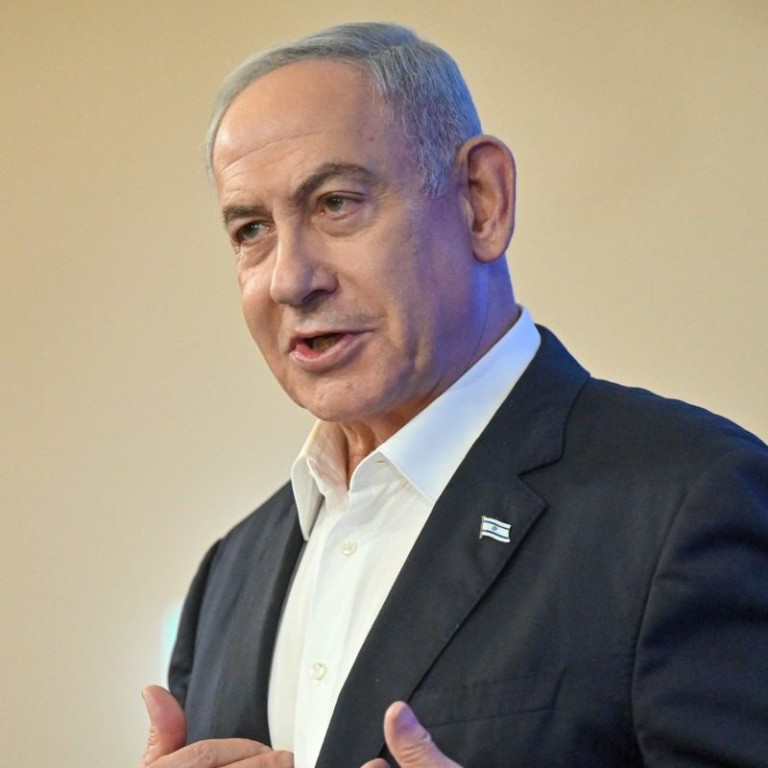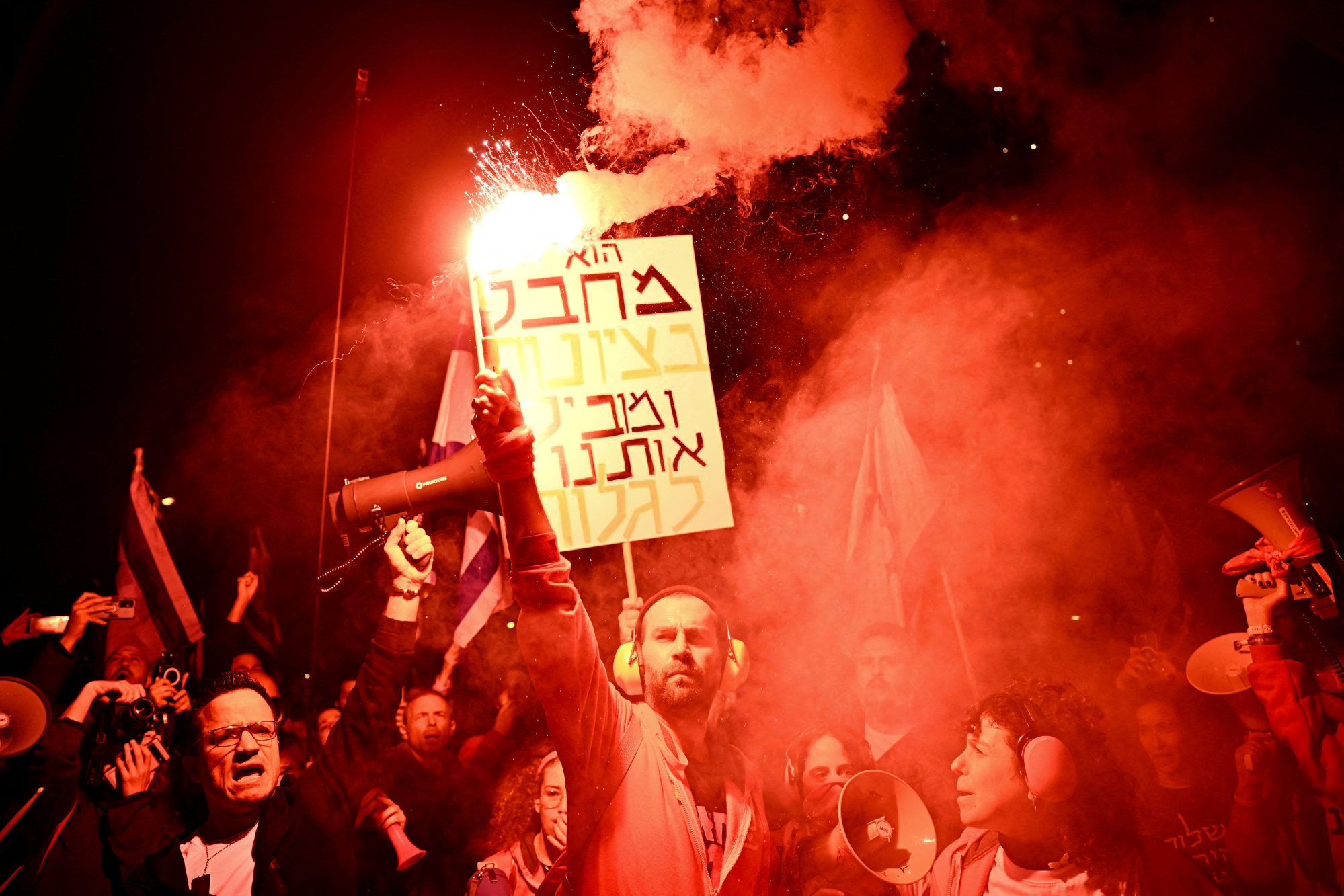
Israel-Gaza war: Netanyahu insists on Rafah military offensive ‘to settle score’ as Israeli strikes kill at least 18
- Netanyahu said ‘the score will be settled’ with Hamas, and a future peace settlement with the Palestinians would not be dictated by international parties
- He warned against awarding the Palestinians with a state after this unprecedented terror’
Despite international warnings, Israeli Prime Minister Benjamin Netanyahu confirmed that an Israeli military offensive would be launched in Rafah in the southern Gaza Strip.
“Of course, only after we make it possible for civilians in the combat zones to move to safe areas,” Netanyahu told journalists on Saturday in Jerusalem.
He emphasised that they would not bow to international pressure on this issue. “Anyone who wants to prevent us from operating in Rafah is ultimately telling us ‘lose the war’.” He would not allow this to happen.
Netanyahu said that “the score will be settled” with the Hamas leadership. This was only a matter of time.
A future peace settlement with the Palestinians would not be dictated to by international parties, he said.
“A settlement can only be reached through direct negotiations between the two sides without preconditions,” he said.
Israeli strikes across Gaza killed at least 18 people overnight and into Sunday, according to medics and witnesses.
An airstrike in Rafah overnight killed six people, including a woman and three children, and another strike killed five men in the southern city of Khan Younis, the main target of the offensive over the past two months.
Biden says Israel should not press into Rafah without plan to protect civilians
Netanyahu, reacting to media reports that the United States and other allies could recognise a Palestinian state without Israel’s consent, said Israel under his leadership would vehemently oppose such “unilateral recognition of a Palestinian state.”
He warned against awarding the Palestinians with a state after “this unprecedented terror.”
G7 foreign ministers warned of “potentially devastating consequences” for civilians if a military offensive was launched in Rafah.
In a statement, the group of industrialised nations called for “urgent action to address the catastrophic humanitarian crisis in Gaza,” particularly the plight of 1.5 million civilians sheltering in Rafah.
Ensuring the “full, rapid, safe and unhindered humanitarian access in all its forms to the Gaza Strip remains an absolute priority,” the statement added.
In addition to Germany and Italy, the G7 countries of economically strong democracies also include France, Japan, Canada, the US and Britain.
Thousands of Israelis protested in various cities on Saturday against the policies of Netanyahu’s right-wing religious government.

At a large rally in the coastal metropolis of Tel Aviv, a central street was blocked off, the news website ynet reported.
Many demonstrators called for new elections. Others spoke out in favour of a ceasefire in the Gaza war and a swift deal with the Palestinian militant organisation Hamas for the release of further hostages.
Protests also took place near Netanyahu’s villa in Caesarea.
In Gaza, the Israel Defence Forces (IDF) had arrested 100 people amid its operation in the Nasser Hospital in Khan Younis in the southern Gaza Strip, the army said on Saturday.
“The soldiers continue to operate in the area of Khan [Younis] and apprehended 100 individuals suspected of terrorist activity in the Nasser Hospital so far, in parallel to additional IDF activity in the central Gaza Strip,” the IDF said in a statement.
Israeli forces entered the hospital in southern Gaza’s largest city on Thursday, with the stated aim of recovering the bodies of Israeli hostages that had been abducted into the coastal area following the October 7 attacks by Palestinian extremist organisation Hamas and other militant groups on Israel.
The IDF have so far not said whether they managed to do so.
“The activity is based on IDF intelligence indicating that Hamas terrorist activity is being carried out from within the hospital,” the IDF said, adding it also killed “terrorists” near the hospital and a number of armed Palestinians were killed in separate operations in Khan Younis and in central Gaza.
A total of 28,985 Palestinians have been killed and 68,883 others injured in Israeli strikes on Gaza since October 7, the Gaza health ministry said in a statement on Sunday.
According to UN estimates, most of those killed were women and minors.
At least 127 Palestinians have been killed and 205 others injured in the past 24 hours, the ministry added.
So far, five patients in the Nasser hospital intensive care unit have been killed due to a power outage amid the Israeli operation cutting their oxygen supply, according to Gaza’s Health Ministry.
Further patients including newborns in incubators are at risk, the authority has warned, accusing Israel of preventing the relocation of the severely ill to other hospitals and blocking a UN aid convoy from reaching the Nasser hospital.
Biden hardens tone on Israel’s ‘over the top’ response in Gaza
Meanwhile, Egypt has rejected reports that it is creating a buffer zone near its border with the Gaza Strip to accommodate up to 100,000 Palestinians.
Diaa Rashwan, head of the State Information Service, said that Cairo was against the expulsion of Palestinians and also against them leaving the Gaza Strip voluntarily. However, Egypt had already built a buffer zone and fences on its side of the border long before the start of the Israeli military operation in the coastal strip, the statement from Friday evening continued.
Dpa had previously learned from Egyptian security sources that the country was planning to create the buffer zone. A wall would be erected around the area to maintain checks on Palestinian refugees if necessary, the sources said on Thursday.
Work began around two months ago to accommodate refugees in buildings and tents, according to the information.
Additional reporting by Associated Press and Reuters

